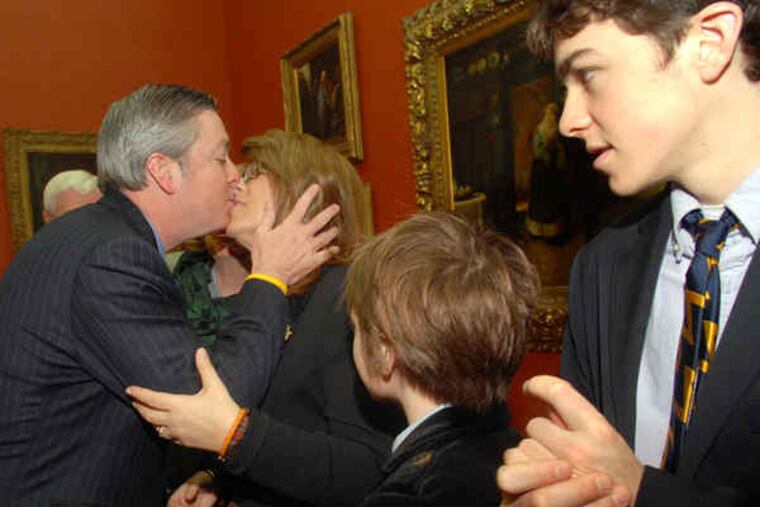Fry elected Drexel's next president
Elected Drexel University's next president by unanimous vote yesterday, John A. Fry overcame initial skepticism about his lack of a doctorate and won people over with his inclusive leadership style, personable approach, knack for urban development, and Philadelphia experience.

Elected Drexel University's next president by unanimous vote yesterday, John A. Fry overcame initial skepticism about his lack of a doctorate and won people over with his inclusive leadership style, personable approach, knack for urban development, and Philadelphia experience.
Fry, 49, a former University of Pennsylvania executive who is in his eighth year as president of Franklin and Marshall College in Lancaster, starts at the 22,000-student Drexel on Aug. 1.
Chosen from among 150 candidates and four finalists - all sitting college presidents - Fry replaces Constantine Papadakis, who died in April after a prolonged battle with lung cancer.
Fry, whose name had been frequently mentioned as a possible replacement for Papadakis before the university launched a national search, repeatedly praised Papadakis and promised to build on his 14-year tenure during which Drexel started both medical and law schools and a graduate campus in Sacramento, Calif., improved finances and expanded enrollment.
University officials declined to release Fry's salary. As a private school, salaries typically aren't made public until tax forms are filed.
Trustees and faculty dismissed the lack of a doctorate.
"Starting out, he wasn't at the top of my list in part because of the academic experience," said Drexel Faculty Senate head Michael Kennedy, a member of the search committee who visited Franklin and Marshall to talk with staff. "But in meeting him and hearing him speak . . . he really seemed like he'd be a very effective leader. And in the role as president, ultimately, leadership is the principal criteria."
Trustee Donna Gentile O'Donnell said the academic prowess of provost Mark Greenberg enabled the university to choose a more nontraditional leader. That "can be extremely successful, and that's what we anticipate," said O'Donnell, who has a doctoral degree from Penn in health policy.
Fry, who has spent his career in higher education administration as a consultant and then executive at Penn, said he put himself through graduate school while raising a family and became so involved in work that getting a Ph.D. didn't seem practical.
But he said: "I have the heart and soul of an academic."
Fry has a bachelor's degree in American civilization from Lafayette College in Easton and a master's in business administration from the Stern School of Business at New York University.
During his tenure at Franklin and Marshall, a 2,200-student liberal arts college, Fry lowered the student/faculty ratio to 10-1. He saw a 63-point gain in average SAT scores of incoming students, increased financial aid to needy students by 14 percent, and renovated and expanded the campus, Franklin and Marshall officials said.
He oversaw the transformation of an abandoned industrial property into a $35 million residential and retail complex. With others in the community, he initiated the $75 million Northwest Gateway Project, which cleaned up a former industrial site.
At Penn from 1995 through 2002, Fry was executive vice president and chief operating officer leading its neighborhood revitalization - an experience that Drexel Trustees chair Richard Greenawalt cited as a plus for his candidacy.
Fry was a candidate for president of Temple in 2006, but withdrew. He said yesterday that he wasn't ready to leave Franklin and Marshall and called to withdraw his name on the way home from the interview.
"I hadn't completed a body of work that I was proud of yet," he said.
Fry revealed little about his plans for Drexel, saying that he wanted to meet people, learn more and collaborate on a vision. Fry told Drexel administrators at a meeting with them on Monday that at Franklin and Marshall, he interviewed staffers and developed a "white paper" outlining issues he saw there, said Joan McDonald, Drexel's senior vice president of enrollment management.
"That apparently gave Franklin and Marshall the ability to open up and say yes, these are issues. It helped him form his first strategic plan," she said. "We expect he'll do something similar here when he arrives."
Fry outlined priorities, including building its $450 million endowment, getting research grants for the good of Drexel and the community, furthering globalization, and developing the Drexel network beyond the city.
But he also stopped short of embracing the plan touted by Papadakis for an undergraduate campus in Sacramento. Drexel started a graduate campus there because Papadakis saw it as a way to expand westward and tap into a growing population area.
"Right now, I would sort of like to put Sacramento aside and focus on the Drexel network," he said.
Fry also said he wanted to improve the quality of undergraduate life and "create a love and passion for the institution" among students.
"He said he wanted to have office hours available to students," said junior Cameron Birch, 21, of Princeton, editor of the student newspaper.
Fry was joined at the news conference by his wife, Cara, his parents and two of his three children - Phoebe, 9, and Nat, 15. His daughter Mia, 19, is a freshman at Williams College.
Standing before hundreds of staff and students on three floors of Drexel's cavernous main building, Fry spoke of his family.
Mia Fry is studying humanities, playing squash, and planning for an internship at the Metropolitan Museum of Art in New York, he told the crowd, tearing up.
"That's a proud father," said Mary Madeira, a graphic designer.
"That bodes well for students," said colleague Anoo Sukhia. "He looks upon them as kids coming here to school, not just here's a little business."